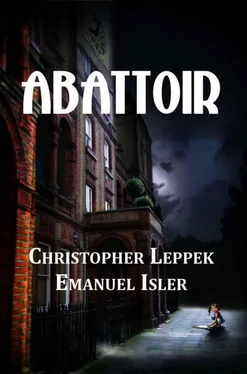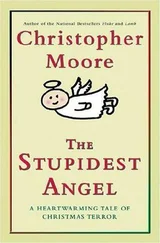The two words Anna had uttered at the window were the last she had spoken. Now, as Anna lay on her bed, eyes wide open, totally silent, it seemed as if nothing had changed at all.
The girl’s mother had spent the last few hours pleading with her, to say more, to express something, anything, afraid that it had all been some kind of cruel joke, perhaps on the Exeter’s behalf.
“Anna… baby… sweetheart… say something. Please say something to Mommy.”
Cantrell approached from behind, placing a hand on her shoulder.
“Let her be, Su. Let’s give her a little break.”
Su Ling nodded in resignation, rising to accompany him out of the room. But as they left, Cantrell turned once more to Anna. He saw—but did not mention—that her gaze drifted away from the ceiling toward the window, as if she were waiting for something.
§
With most people, it would have been considered plotting. In the case of the Old Man, who was incapable of such sophisticated thought, it was more instinctual; an intent without context.
He spent his afternoon as he’d spent thousands before—eating his noon meal in familiar isolation; walking, hands behind his back, through the corridors of the nursing home, staring straight ahead, noticing nothing. Only when he reached the doorway to the common room did he pause, staring at the residents playing checkers, watching soap operas, making drawings with crayons. Then he turned away, resuming his aimless stroll.
It was such an ordinary afternoon for the Old Man that nobody—residents or staff—paid any special heed to his ritualistic movements. To them, he may as well have been a ghost. The old man was such a familiar figure, such a fixture, that he virtually blended into the faded floral wallpaper.
Outside, as the winter light grew dim, a few snowflakes began to fall. The Old Man did not notice them. He did notice, however, that the dinner bell had rung. He began to shuffle toward his traditional and isolated table.
§
Su Ling and Cantrell slept the deep sleep of total exhaustion. They lay with their arms wrapped around one another, their breathing deep and steady, their slumber desperately needed.
But Anna did not sleep.
She lay in her room, eyes open, staring at the ceiling, as she had done for much of the day. But when the flat grew silent at last—its only sound the metronomic ticking of the cat’s tail—the girl rose from her bed.
She quietly opened the blinds and regarded the deep gray of the night. In one smooth motion, Anna opened the window wide.
A blast of icy air swept over her tiny body, but she paid it no apparent heed. She breathed in the cold air, snowflakes settling in the perfect blackness of her hair, the smooth contours of her cheekbones.
She stared out into the snowy night.
§
The call was louder than ever now. The Old Man responded at last.
He did not know how late it was, for he paid no attention to clocks. But he knew it was night and he knew it was time.
The Old Man carefully dressed himself. He did this at a time when all of the other residents of the nursing home were long asleep. He put his on his battered corduroy coat, weathered boots and an old baseball cap he had found in the common room.
With great care, he cracked open the door to his room and examined the hallway, looking right and left, just as all the residents had been told to do when preparing to cross the street.
It was empty, lit only by faint utility lights.
With a cat’s stealth, he made his way down the long hallway, past rooms reverberating with snores and forgotten televisions, past the side exit door, which he knew would be locked.
Instinct led him through the dining area, dark and empty, into the kitchen. It too was dark and empty, and he was alone as he walked slowly over its tiled floors.
A sound jarred him. It was like thunder, which always terrified him, and he stopped in his tracks. His eyes went to the source, identified the stainless steel box in which ice cubes were made, and resumed his stealthy walk.
The kitchen’s back door was faintly illuminated by the green glow of an exit sign and the Old Man walked directly to it. If he had been aware of such emotions, he would have felt gratitude when he found it to be unlocked.
He felt the frigid air of the outdoors, but experienced no real discomfort from it. Nor did he experience any sense of freedom, for such concepts were meaningless to him. He walked slowly and deliberately through the courtyard, out the gate and onto the deserted, snow-covered street.
Toward the voice that called.
The snow fell gently, a dry, crystalline powder that squeaked beneath his boots. The air was bitter cold and not a soul, besides him, was out. His were the only footprints visible in the pristine snow.
As he trudged, the surroundings gradually changed. The facility— his home for far longer than he could remember—was gone from sight. Replacing it were suburban ranch houses and quickie marts, gas stations and coffee shops. These, in their turn, were replaced by older structures, second-hand stores and pawnshops.
Eventually, these too disappeared, giving way to old factories and weathered warehouses, dimly lit and made of battered red brick.
The voice was clearer now, its beacon resonating in his skull.
He stopped.
He did not know what it was, this hulking shape that loomed alone on the horizon, but something about it terrified him.
He hadn’t felt this emotion for as long as he could remember.
The place was tall and dark, wide and imposing. It had a tower, with a clock’s face.
He’d been there before. He sensed this instinctually, as he did everything else. In the same way, he knew that this place was very, very bad.
And very, very good.
The Old Man started toward the vision, with the same steady and relentless pace he had maintained throughout the night.
For the voice was coming from within it.
Since time was not important to him, he did not know how long it took to reach the place, but he eventually did. Only then did he halt his steady march.
He stood before its massive door, a strange and frightened knight having arrived at the destination of his quest.
He brought his hand up to knock, but before his aged knuckles could touch the cold wood, the door creaked open.
Warmth and light poured out into the night. And much more—the smiling face of a young, beautiful girl.
Her eyes met his; black against blue. Her tiny soft hand took his gnarled, old one and gently led him inside the Exeter.
=§=§=§=
What’s coming?
Solitude was giving way. Something approached. A shape, a feeling.
Confusion.
Very hot, yet very cold. Terrifying, yet pleasing.
Confusion.
Everything was spinning. And stopping. Spinning and stopping.
Why was this feeling familiar? What was this shape? What did it want?
Does it want me? Who is “me?” What is “me?”
Anticipation, dread.
Rapid passage through solid forms, then passage back. The desire to escape, the need to hide, deep down below. And the desire not to hide. The need to come out. To embrace.
A quandary. Clearly a quandary. But what is a quandary?
Confusion.
Only one clarity amidst all the hot, the cold, the fear, the joy—no escape.
Whatever was to happen, would happen. Was supposed to happen. Could not be stopped from happening.
=§=§=§=
Su Ling’s eyes shot open in the silence of deep night.
Wrong. Something terribly wrong.
“Alex!”
She shook the sleeping man almost violently, not yet noticing the frigid cold that enveloped the bedroom.
Читать дальше












